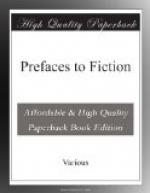A significant phase of Mrs. Manley’s discussion is the emphasis upon individual characterization and, in characters, upon not only the “predominant Quality” and ruling passion of each but also upon the elusive and surprising “Turnings and Motions of Humane Understanding.” Here one should recognize the influence of historical writing rather than of poetry. As Rene Rapin had made clear in Chapter XX of his Instructions for History (J. Davies’s translation, 1680), the historian writes the best portraits who finds the “essential and distinctive lines” of a man’s character and the “secret motions and inclinations of [his] Heart.” But Mrs. Manley’s remarks go beyond Rapin’s in implying faith in a sort of scientific psychology, especially of “the passions.” Other writers showed the same interest and worked toward the same end. Thus Henry Gally in his essay on Theophrastus and the Character was so carried away by a notion of the importance of the Character-writer’s knowing all about the passions that he allowed himself to say that only by such a knowledge could a Character be made to “hit one Person, and him only"[6]—the goal obviously not of the Character-writer but of the historian and the novelist. The authors of The Cry[7] (1754) regarded the unfolding of “the labyrinths of the human mind” as an arduous but necessary task; indeed they went on to declare that the “motives to actions, and the inward turns of mind, seem in our opinion more necessary to be known than the actions themselves.” It was Fielding’s refusal, in spite of the titles of his books, to write like an historian with highly individualized and psychological characterizations that caused his admirer Arthur Murphy to admit in his “Essay” on Fielding that “Fielding was more attached to the manners than to the heart."[8] He thought Fielding inferior to Marivaux in revealing the heart just as Johnson, according to Boswell, preferred Richardson to Fielding because the former presented “characters of nature” whereas the latter created only “characters of manners.” The author of “A Short Discourse on Novel Writing” prefixed to Constantia; or, A True Picture of Human Life (1751) went so far as to say that prose fiction may teach more about the “sources, symptoms, and inevitable consequences” of the passions than could easily be taught in any other way. The increasingly subjective and individualized characterization in English fiction was well supported in contemporary theory.
The Jewish Spy, translated from the Lettres Juives (1736-38) of Jean-Baptiste de Boyer, Marquis d’Argens, is an early example of citizen-of-the-world literature and contains in its five volumes a “Philosophical, Historical and Critical Correspondence” dealing with French, English, Italian, and other matters. The work had a European vogue, and there were at least two English translations, the present one, issued in 1739, 1744, and 1766, and another, called Jewish




